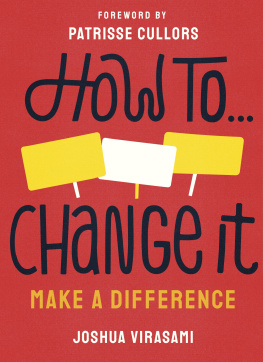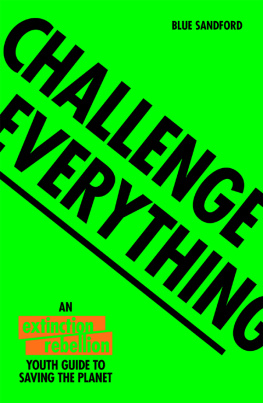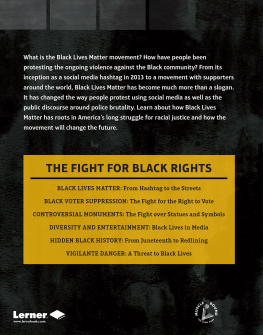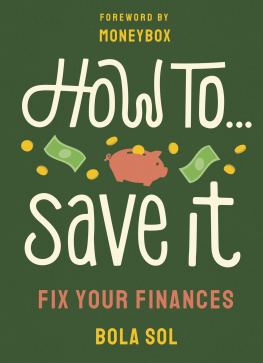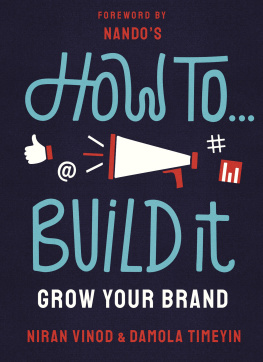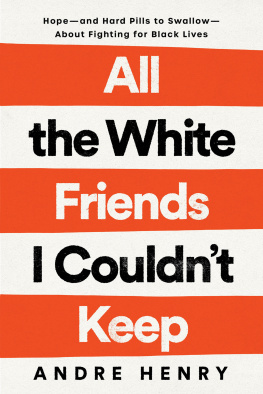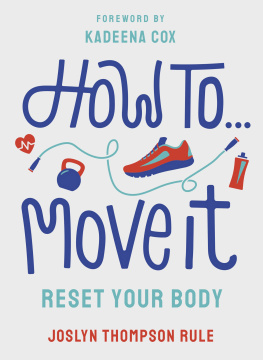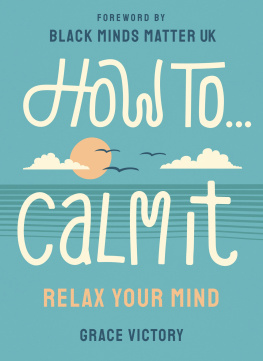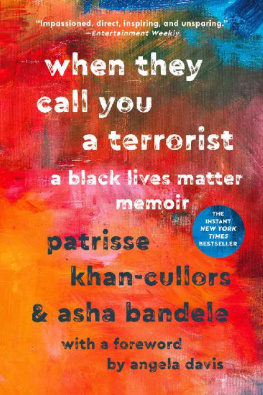Notes

Joshua Virasami
HOW TO CHANGE IT
Make a Difference

CORNERSTONE
UK | USA | Canada | Ireland | Australia
India | New Zealand | South Africa
Cornerstone is part of the Penguin Random House group of companies whose addresses can be found at global.penguinrandomhouse.com.

First published by #Merky Books in 2020
Copyright Joshua Virasami 2020
Lines from The Heart of the Race: Black Womens Lives in Britain by Beverley Bryan, Stella Dadzie, and Suzanne Scafe are reprinted by kind permission of Verso Books.
The author and publishers have made all reasonable efforts to contact copyright holders for permission, and apologise for any omissions or errors in the form of credit given. Corrections may be made in future reprints.
The moral right of the author has been asserted
Cover and Text Design Andreas Brooks
ISBN: 978-1-529-11915-2
This ebook is copyright material and must not be copied, reproduced, transferred, distributed, leased, licensed or publicly performed or used in any way except as specifically permitted in writing by the publishers, as allowed under the terms and conditions under which it was purchased or as strictly permitted by applicable copyright law. Any unauthorized distribution or use of this text may be a direct infringement of the authors and publishers rights and those responsible may be liable in law accordingly.
This book is dedicated to Shaun Mitchell, whose soul and fight lifted our spirits and showed us a better way of being with each other in the world.
Inna lillahi wa inna ilayhi rajiun.
Verily we belong to God, and verily to Him do we return.
Quran, 2:156
Foreword
I often think about these words: how to change it. They are words that have long been reverberating inside my bones, with what feels like the ancestral challenge in my DNA, the call to action that so many of us have stepped up to. We, the community organisers, the youth who walked out of classrooms in protest, the ones collecting signatures and contact information outside of the jails that caged our loved ones, the involved parents and guardians of our children, and the neighbours that care too much all of us who seemed so unassuming, but were taking notes. We took notes from the freedom fighters who were fighting side by side with us, and the ones we learned about from textbooks but, as many of us will readily confess, we were making it up as we went along. No one could have prepared us for the challenges of twenty-first-century organising not its global triumphs nor its insidious setbacks.
Growing up, I was not aware that organising was a thing that still existed. I grew up in the San Fernando Valley in California a last vestige of the once suburban part of Los Angeles, which was now home to families like mine: poor, working-class, people of colour. I lived near the General Motors Assembly Plant in Van Nuys, an automobile factory that opened up in 1947. This automobile factory, as much as it was a health hazard for the community members who were forced to breathe in its pollution, was also the employer of the many black and brown men and women whose wages made it possible for their families to live with a decent quality of life. In fact, my father was a GM plant employee. His job was the reason my family had adequate health insurance. In the early 1980s, amidst the era of Reaganomics, the GM plant threatened to outsource, with little apparent remorse or afterthought of the devastation this would leave the families whose livelihood depended on it. Through the organising efforts of coalitions from all sectors, community organisers gathered church leaders, union workers, filmmakers, community members everyone, essentially to protest and boycott the closing of this plant. And it worked. The GM plant stayed open for another ten years.
This happened right in my neighbourhood, and yet I still had no idea how much organising had already impacted my life and the role it has played in changing entire systems. Much of my own organising work is rooted in the theories and philosophies of successful organisers around the world and throughout time. Whether it be Rigoberta Mench, an indigenous freedom fighter from Guatemala, fighting for the rights of her people and indigenous people the world over. Or Angela Davis, a mentor and friend, who has laid the foundation for modern abolitionism within the United States and across the world. Each of these leaders lead not just with fierce passion, but also with a clear analysis of how we get to the goal: freedom.
Most of us do not grow up with a concept of organising or campaigning. When it is portrayed in the media, its usually a one-dimensional display of the complex organism organising actually is. A caricature of a civil rights leader, say. We usually dont understand the role of strategy, and that organising is a science. With this writing project, Joshua is bringing a lifetime of personal and political experience to bear. When we are gifted books such as How to Change It, we are giving multiple generations an opportunity to show up for the resistance movement.
I am grateful to Joshua for outlining what resilience and change can look like for folks across the globe who are also thinking about these words, and, thankfully, here is a book that shows us how. How to change the material conditions for the most vulnerable. How to build power with the folks at the margins. And how to win when it feels like winning is absolutely impossible. When we are provided with tools to take on the very state that often interrupts our ability to live long and thriving lives, we are given an agency that only organising and campaign work can provide. Joshua is one of the most brilliant leaders of his time. I met him as he organised with Black Lives Matter UK. His values and principles are always at the centre of his organising; he was precise and clear while also being deeply compassionate. We need his voice to instruct us, to tell stories about us. We need his voice amplified to bring us together. Highlight the words that transform you. Underline and write out the definitions of new words that challenge you. Write on the page as though Joshua can hear you. Take these words as an opportunity to have a healing conversation. You need it. I need it. We all do.
This is how we show up. This is how we change it. This is how we take action.
Patrisse Cullors,
May 2020
Introduction
We have to turn thinkers into fighters and fighters into thinkers
General Gordan Baker, Jr, American
labour organiser and activist
POLITICS HAPPENED TO ME
I wasnt at all political as a teenager. Youth politics was mostly for the more affluent kids at school. But politics happened to me, as it happened to most of my mates, and as it happens to most of us. I just didnt have any sense that I could do anything to politics in return. Things feeling unfair was a pretty constant theme for me as a young person, with shopkeepers banning me for theft I hadnt committed, librarians revoking me for noise I didnt make, police officers stopping and searching me for crimes I didnt commit, and head teachers suspending me for things I didnt participate in. Ive never taken well to unnecessary interrogation. Why should I? To me, it seemed a lot of people I knew had a secret cop inside them, who wanted me to account for the most trivial things: Why do you have 200?, Why are you in this neighbourhood? and so on.

